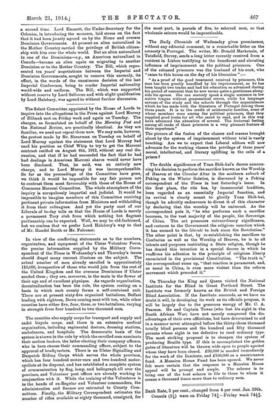The Select Committee appointed by the House of Lords to
inquire into the allegations in the Press against Lord Murray of Elibank met on Friday week and again on Tuesday. The charges, as formulated on behalf of the Morning Post and the National Review, are practically identical. As they are familiar, we need not repeat them now. We may note, however, the protest made by Mr. Shearman on Tuesday on behalf of Lord Murray against the statement that Lord Murray had used his position as Chief Whip to try to get the Marconi contract ratified on August 6th, 1912, without any real dis- cussion, and that if he had succeeded the fact that he had had dealings in American Marconi shares would never have been disclosed. That, he said, was an entirely new charge, and to Lord Murray it was incomprehensible. So far as the proceedings of the Committee have gone, we think it would be impossible for any fair person not to contrast them most favourably with those of the House of Commons Marconi Committee. The whole atmosphere of the inquiry is scrupulously impartial and judicial. It would be impossible to imagine members of this Committee receiving pertinent private information from Ministers and withholding it from their colleagues. And yet the party cant of our Liberals of to-day tells us that the House of Lords is merely a permanent Tory club from which nothing but flagrant partisanship can be expected. Well, we may be old-fashioned, but we confess that we prefer Lord Halsbury's way to that of Mr. Handel Booth or Mr. Falconer.










































 Previous page
Previous page